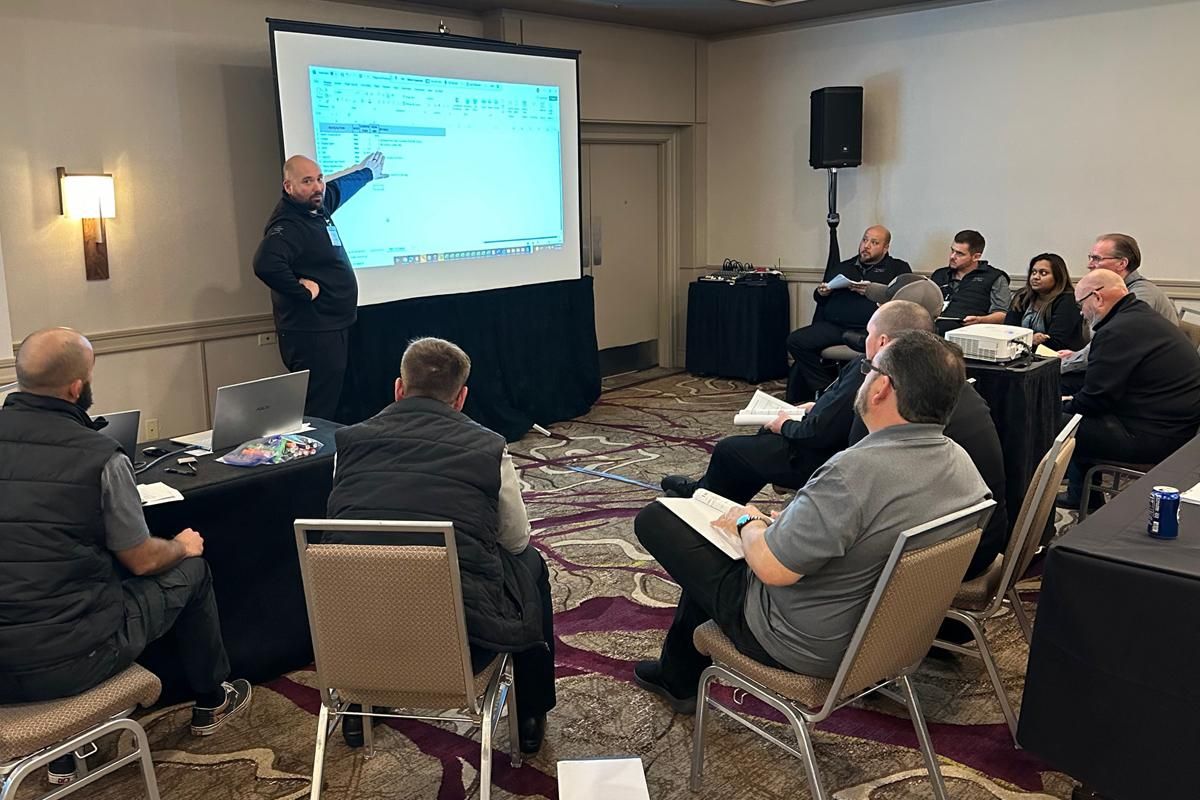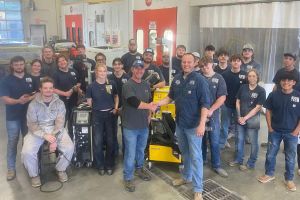Conventional views ding multi-shop operators (MSOs) for industry changes -- sometimes as these come regardless, or by other routes -- but all shops, including independent owner-operators, can develop people.
More MSOs recruit, train and develop managers at the shop level and for regional and corporate roles.
Necessity is the mother of invention, and desire drives intent: rolling up body shops requires a consistent, concentrated talent funnel, and groups seeking excellence simply want to.
It’s in-house or through outside programs, often both. As Caliber Collision nears 2,000 locations, a systematic and systemwide workforce development push grows with it apace. Smaller MSOs, including California’s G&C Auto Body, also implement in-house programs. Smaller groups and indie shops can pursue training and development from larger outside providers, including Certified Collision Group, Collision Advice and Driven Brands. In South Carolina, Better Collision Centers loves Discover Leadership Training’s retreats and onsite offerings.
Going more granular, consider specific-focus coursework like training front office folk in body shop basics at 3M’s Collision Repair Academy. A slew of solo development adventure guides seize the challenge by podcast or other means. These can ensure baseline best practices and identify employees for future larger roles.
The focus isn’t general tech training or apprenticeship, vital as that is, but finding and developing people, in or out of the company, who’ll help run it in years to come.
Welcome to Our Home
At the G&C Auto Body Leadership Summit in March, they served steak, but it was invitation-only.
Invites went to up-and-coming body shop managers at the MSO, which has nearly 50 northern California sites.
“We did the first one two years ago,” when the location count was 32, said Patrick Crozat, co-owner and vice president. The summit is two days, “mandatory for leadership” and G&C created all the content, with industry information from CCC’s Elevate consulting practice. A past speaker was Dave Anderson of LearnToLead.
Crozat said the company learns and hones its offering. Participants have sought more breakout time and body shop-specific instruction, for instance.
The rest of the regular year includes monthly calls of regional heads and senior leaders, with mention of “rising stars and top performers” -- who’s next, Crozat said. In “a culture of identifying talent, you look at who’s ready to move up, then talk with them; are they willing to relocate,” for instance, and where’s the next shop opening?
“Then we can start working with the guy.”
Patrick and his brothers and co-owners -- Josh Crozat, process improvement officer, and Shawn Crozat, CEO -- earlier on went to Mike Jones’ Discover Leadership Training four-day intensives, and then began developing G&C’s deal.
“We spent several hundred hours going through every aspect of how to run a shop,” Patrick Crozat said, developing vision and mission, creating collateral materials, digital checklists, how to promote and videos.
“People are afraid to train,” Crozat said. “They say ‘train them, and they’ll leave.’ Would you rather not train them and they stay?"
Mrs. Best Said to Do This
“I realized talent was what I need” at Better Collision Centers, CEO Jonathon Best told Autobody News. This was in founding it, after running another regional MSO. CFO Glenn Kermes had been with John Harris Body Shops, and Best plucked COO Wade Sill from work at Caliber and Kaizen. His top marketer Sinan Colak has Red Bull experience. Two of these three also help run independent companies, including a classic resto shop.
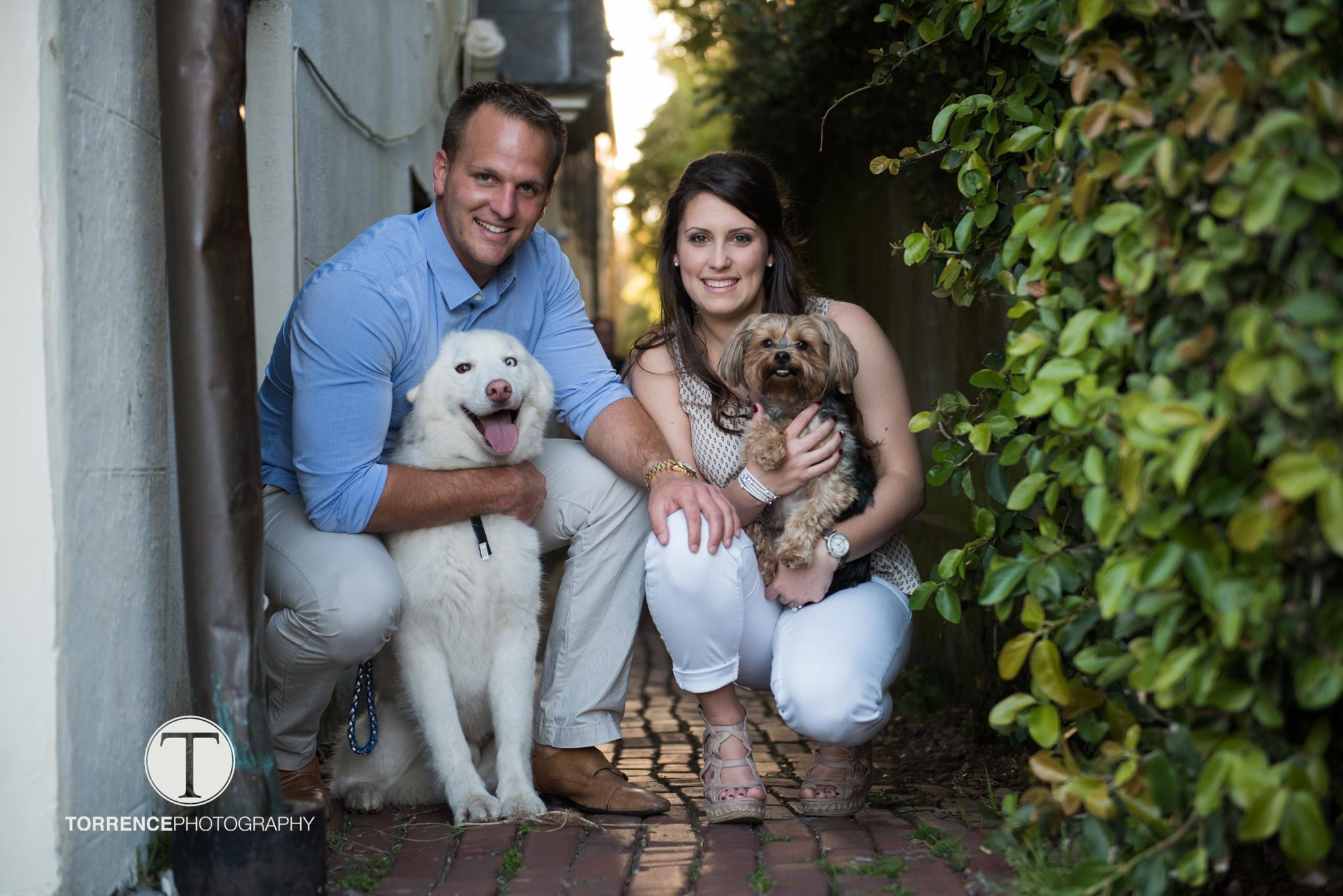 Jonathon and Taylor Best.
Jonathon and Taylor Best.
Best’s team “brought structure … completely overhauled financials [and] changed the way we operated.”
But top credit for training and development goes to his wife, Taylor Best.
“We do all the external leadership summits,” Jonathon said. “Training seminars, team-building, we take cues from those for internal training” as well.
Then Taylor went to Discover Leadership Training. She runs a restaurant the Bests own and “heard me talking about Jones. My wife went and had this experience; when she came home, I did not know who I was talking to.”
Sill had attended while at Caliber, so Better Collision sent two of its people. Best said all new corporate or shop managers will attend.
Biggest Room in the House
Crozat called the Mike Jones curriculum personal growth: “They break you down and build you up.” Taylor Best’s was surely a form of deep clean. Jones has described it as “the largest room in the house is room for improvement.”
“We have them picture their optimal person in a job,” Jones said. “Create a picture with words and attributes and values and energy and aptitude.” Identify the gaps too, he said, to know where more work is required.
This “guided creation” leads to “identifying who fits that” and working with them: “How are they being their best, how are they improving?” If the first week after the new work begins, they get “zero KPIs and the next week it’s one, we bested the best. We’re trending.”
He said ongoing consultation happens “on a 24-hour cycle; we feed-forward -- not feedback -- every day.”
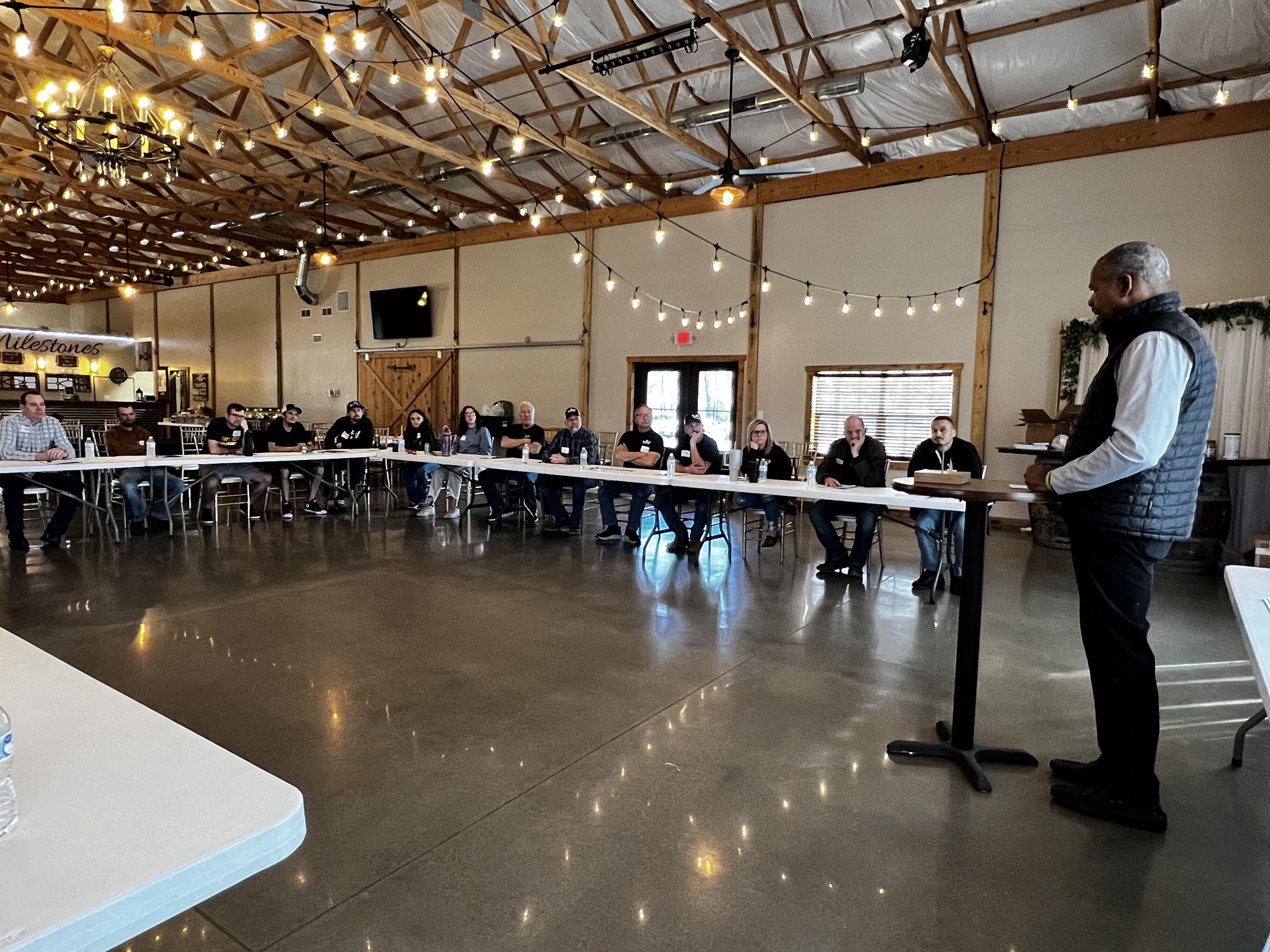 Mike Jones, far right, leads a training program.
Mike Jones, far right, leads a training program.
That’s a roughed-out element of custom in-shop programs, “but our four-day is the flagship, the most intense, the one people talk about.” This runs about $4,700 and newbies must be nominated by past participants, so the Caliber connection came in handy for Jonathon Best, not to mention a fortuitous marriage.
“Everyone sits in the front row, with nowhere to hide,” Jones said of the flagship course, where they “focus on changing two people at a time: me and you.”
He also conducts “Art of the Samurai” outdoor, team-building events. A YouTube presence includes his podcast The Edge -- he calls it a “pod-blast” -- and Mondays with Mike, featuring short, sage snippets.
Other outside entities involved in leadership training include Kaizen Initiatives Inc. in Canada, which also has the KaizenHub podcast-discussion on YouTube. President Lenny Houweling managed a shop in the Concours Collision Centers four-unit MSO bought by Boyd Group in 2017.
I-CAR offers training for developing people internally, including a production management curriculum for running shops, and team leader and shop mentor elements of its I-CAR Academy. The academy also “trains trainers” with materials for “building the best training method and onboarding process for new technicians,” according to a spokesperson via email.
How to Invite People into Your Home
Recruiters are out there, of course, but one MSO would prefer not to.
“I try not to work with recruiters if I can get a personal referral,” said Brightpoint Auto Body Repair Director of Operations Mike Hritzak. Still, with 17 years at this -- he’s worked with Gerber Collision & Glass and Collex Collision -- Hritzak’s found some success with Motorcruit, whose headhunting includes leadership slots. Rush Truck Centers and Wallwork Truck Center recruits on social media; job boards and communities do exist.
But Hritzak does most recruiting for the MSO himself.
“I know somebody who knows somebody,” he said, including suppliers and vendors, not just collision center vets. Or in-shop, a manager sees a second estimator who should be promoted to No. 1, then he gets the manager slot when his boss moves up. “The manager is hiring the next manager: a natural progression.”
R&D -- recruiting and development -- isn’t once a year or for when you’re in trouble, but for all-time.
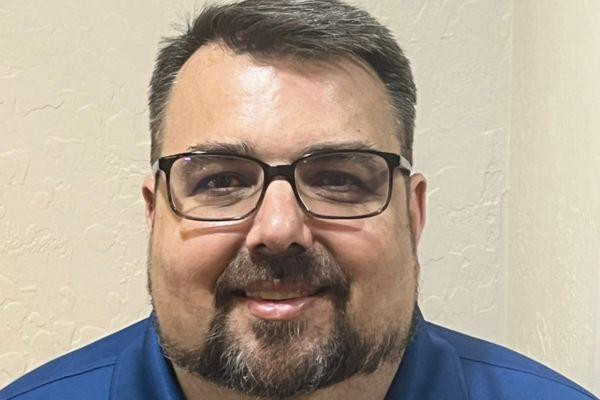 Mike Hritzak.
Mike Hritzak.
“It’s not medicine,” he said, “it’s a consistent regimen, like vitamins or a protein drink,” or the gym.
Brightpoint’s 2025 leadership event theme was “year of accountability and performance” referring on the first point to stakeholders -- customers, suppliers, vendors, employees -- and on the second to its natural results.
GMs came to Las Vegas for three days for theory and application, one-on-one time, and situational examples. Hritzak said “training breeds loyalty; someone’s not going to jump for $100 a week.” He’s also attended Discover Leadership Training early in his career.
Jonathon Best said, “Eighty percent of our social media is recruiting and branding.” Patrick Crozat recently refocused his work to include more time in stores: sure, just meeting staff -- while “recruiting, finding experienced people at shop-level and above. You attract people and talent, and it becomes a self-perpetuating cycle.”
Crozat turned over previous duties to “my right-hand guy of 12 years, Blaine Bessler,” who then left his role in the hands of “his right-hand guy, Phil Cunningham.”
“My aim is to grow people,” Hritzak said. “The goal of the training pipeline is not to need recruiting.”
Conclusion
All this can sound like a full-time job, not that you needed another one. But it’s a journey of a thousand miles by single steps, and operators can still just take the next one, in the context of the overall trip. You can build a pipeline beginning with apprentices, visiting them while they’re still in school. Attend a WyoTech job fair if in their neighborhood and find out which of their students are getting the associate’s degree focused on management.
Once people are in the door, see who should get offered an appetizer of online and skills-specific training. Make media available to cultivate personal growth and watch who borrows books.
Like Hritzak, start talking with industry stakeholders -- vendors, suppliers, trade groups. Scroll with purpose on social media, instead of just decompressing. You’ll find seminars, recruiters, smart techs and painters who don’t just post pictures of stale pizza for an even staler joke. Like Best, take a big-investment plunge. Like the G&C brothers, meet people everywhere.
Spend an hour a week just watching your people go about it. Go to a buddy’s shop for coffee and watch theirs.
Maybe burnish your own skills along the way. All of it is worth it: education vs. ignorance. After all, how old -- and how far along developing people -- will you be if you don’t?
